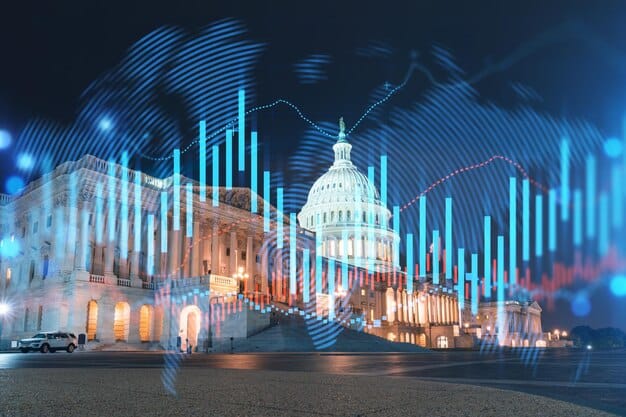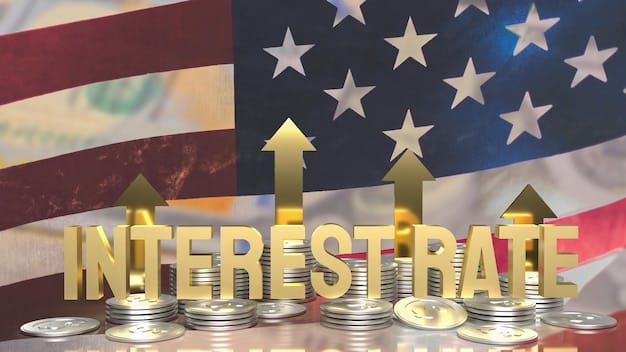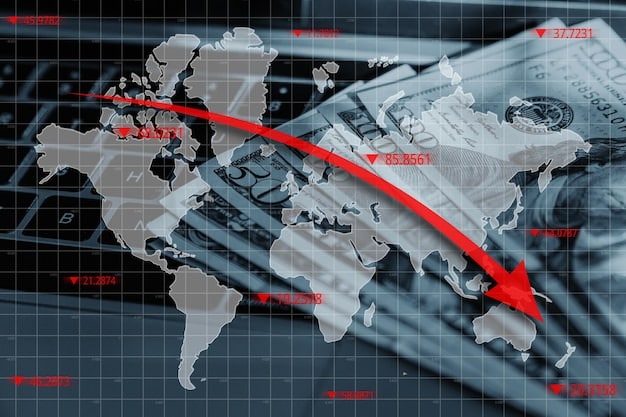How US Inflation Response Affects Interest Rates: A Global News Analysis

How Will the US Response to Global Inflation Affect Interest Rates? The US Federal Reserve’s monetary policy decisions, primarily adjusting interest rates, significantly impact global financial markets. Understanding these actions is crucial for investors and policymakers worldwide.
The global economy is intricately linked, and actions taken by major economic players like the United States have far-reaching effects. Understanding how will the US response to global inflation affect interest rates? is critical for businesses, investors, and individuals worldwide.
Inflation, a sustained increase in the general price level of goods and services in an economy, presents a significant challenge to economic stability. The US Federal Reserve (often referred to as the Fed) plays a pivotal role in managing inflation within the United States. But, what happens when global inflation comes into play, and how do the Fed’s measures ripple across the globe?
Understanding the US Federal Reserve’s Role in Combating Inflation
The Federal Reserve, the central bank of the United States, is tasked with maintaining price stability and full employment. One of its primary tools for achieving these goals is adjusting interest rates.
The Mechanics of Interest Rate Adjustments
When inflation rises, the Fed often increases the federal funds rate, the target rate that commercial banks charge one another for the overnight lending of reserves. This increase ripples through the economy, influencing other borrowing rates.
- Higher borrowing costs: Increased interest rates make it more expensive for businesses and consumers to borrow money.
- Reduced spending: Higher borrowing costs lead to decreased spending and investment.
- Cooled demand: Reduced spending and investment cool down overall demand in the economy, which helps to ease inflationary pressures.
The Federal Reserve operates with a dual mandate: to promote maximum employment and stable prices. Controlling inflation is a key component of achieving stable prices.

Global Inflationary Pressures and the US Response
Global inflation is influenced by various factors, including supply chain disruptions, geopolitical events, and increased demand. When these factors contribute to rising prices in the US, the Federal Reserve may take action.
The Interconnectedness of Global Economies
The US economy is not isolated; it is deeply intertwined with the global economy. Therefore, inflationary pressures originating from abroad can affect US prices and prompt a response from the Fed.
- Import prices: Higher import costs can increase inflation within the US.
- Exchange rates: Changes in exchange rates can further affect import prices.
- Global demand: Strong global demand can also contribute to higher prices in the US.
The Fed carefully monitors global economic conditions to assess the extent to which international factors are contributing to US inflation. This analysis helps inform their policy decisions regarding interest rates and other monetary tools.
How US Interest Rate Hikes Impact Global Markets
When the US Federal Reserve raises interest rates to combat inflation, the effects are felt far beyond US borders.
Capital Flows and Currency Fluctuations
Higher interest rates in the US can attract capital from other countries as investors seek higher returns. This influx of capital can strengthen the US dollar, making imports cheaper for Americans but exports more expensive for other nations.
Countries with weaker currencies, especially emerging economies, may face increased debt burdens and financial instability when the US dollar strengthens.
This international ripple effect highlights how will the US response to global inflation affect interest rates?

Potential Consequences for Emerging Economies
Emerging economies (EMs) are particularly vulnerable to the impacts of US interest rate hikes. These economies often rely on foreign investment to fuel growth, and higher US rates can divert capital away from EMs.
Debt Burdens and Economic Instability
Many emerging economies have large amounts of debt denominated in US dollars. When the dollar strengthens due to US interest rate hikes, these debts become more expensive to repay.
Higher borrowing costs and potential capital flight can lead to slower economic growth, increased financial instability, and even currency crises in emerging economies.
The consequences for emerging economies are important aspect of how will the US response to global inflation affect interest rates?
The Future of US Monetary Policy and Global Implications
Predicting the future is impossible, but understanding the factors that influence US monetary policy can help us anticipate potential scenarios. A key factor is understanding how will the US response to global inflation affect interest rates?
Factors Influencing Future Decisions
The Federal Reserve’s future decisions will depend on a variety of factors, including the trajectory of US inflation, global economic growth, and geopolitical risks.
If US inflation remains stubbornly high, the Fed may need to continue raising interest rates, even if it means slower economic growth and potential global repercussions.
Conversely, if the US economy weakens significantly or global risks escalate, the Fed may pause or even reverse its tightening cycle.
| Key Point | Brief Description |
|---|---|
| 📈 US Inflation | Affects global markets due to the Fed’s response. |
| 🏦 Interest Rate Hikes | Can attract capital, impacting currency values globally. |
| 🌱 Emerging Economies | Face debt burdens and potential economic instability. |
Frequently Asked Questions
The Federal Reserve adjusts interest rates to manage inflation and promote full employment. Higher rates curb inflation by increasing borrowing costs.
Global inflation refers to the increase in the general price level of goods and services across the world, impacting multiple economies.
US actions can influence the monetary policies of other countries, leading to similar adjustments in interest rates to maintain economic stability.
Emerging economies can face increased debt burdens, capital flight, and slower economic growth due to US interest rate policies.
Yes, geopolitical events can create or exacerbate inflationary pressures, influencing the Federal Reserve’s monetary policy decisions.
Conclusion
In conclusion, understanding how will the US response to global inflation affect interest rates? requires acknowledging the interconnectedness of the global economy. Actions taken by the Federal Reserve have ripple effects that can impact financial markets and economies worldwide.
Monitoring these developments and considering the potential consequences is crucial for making informed decisions in an increasingly complex global landscape.





